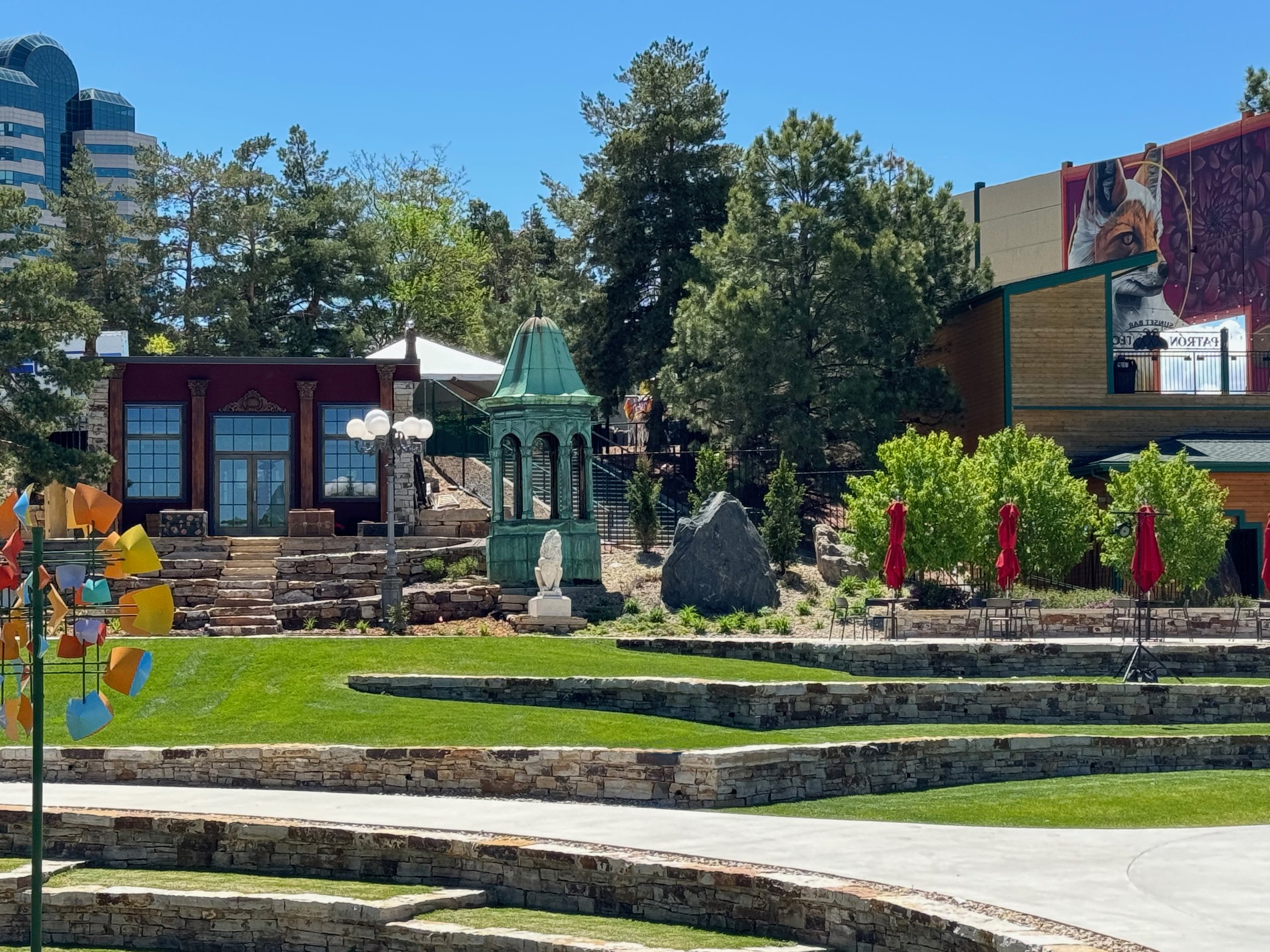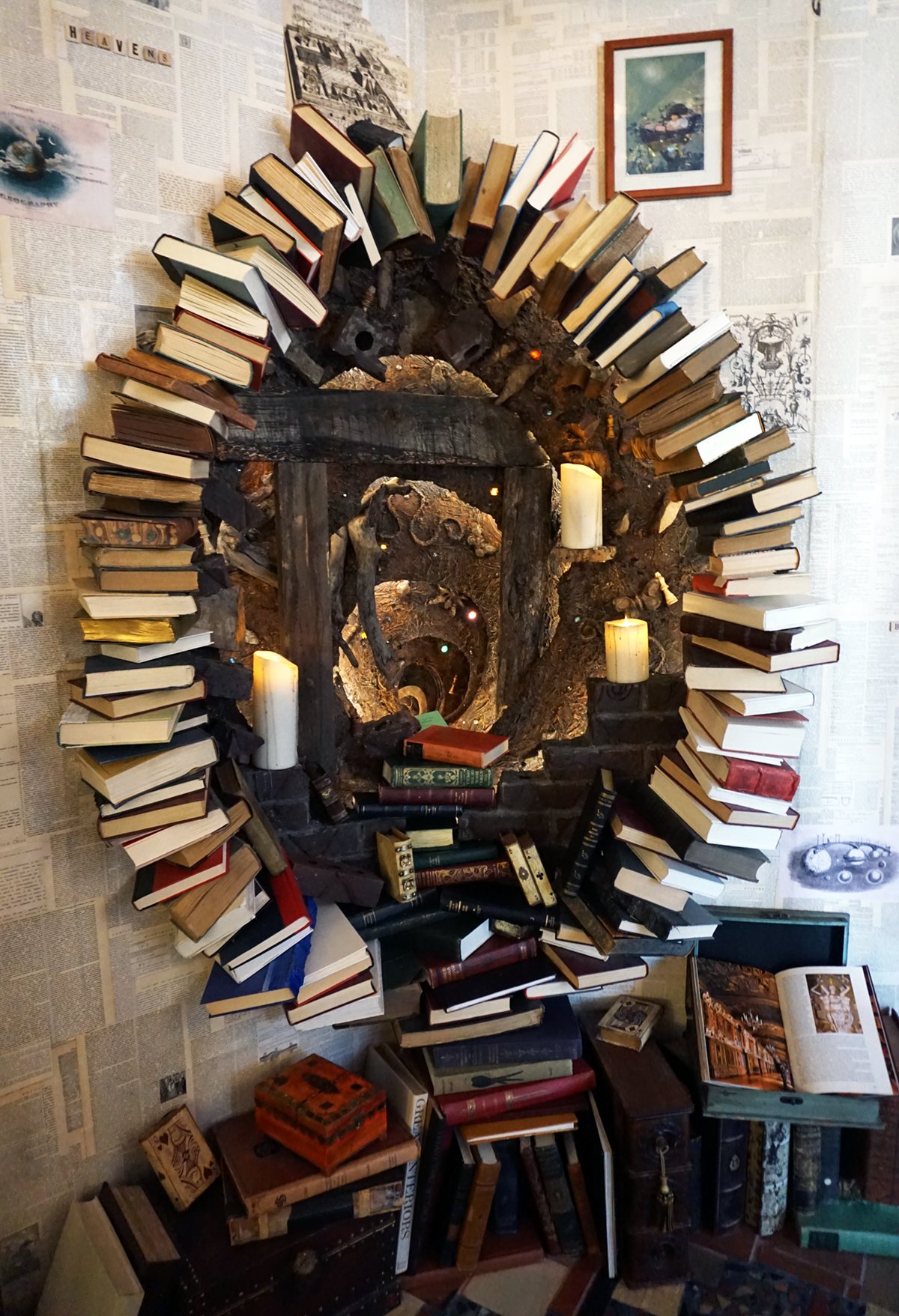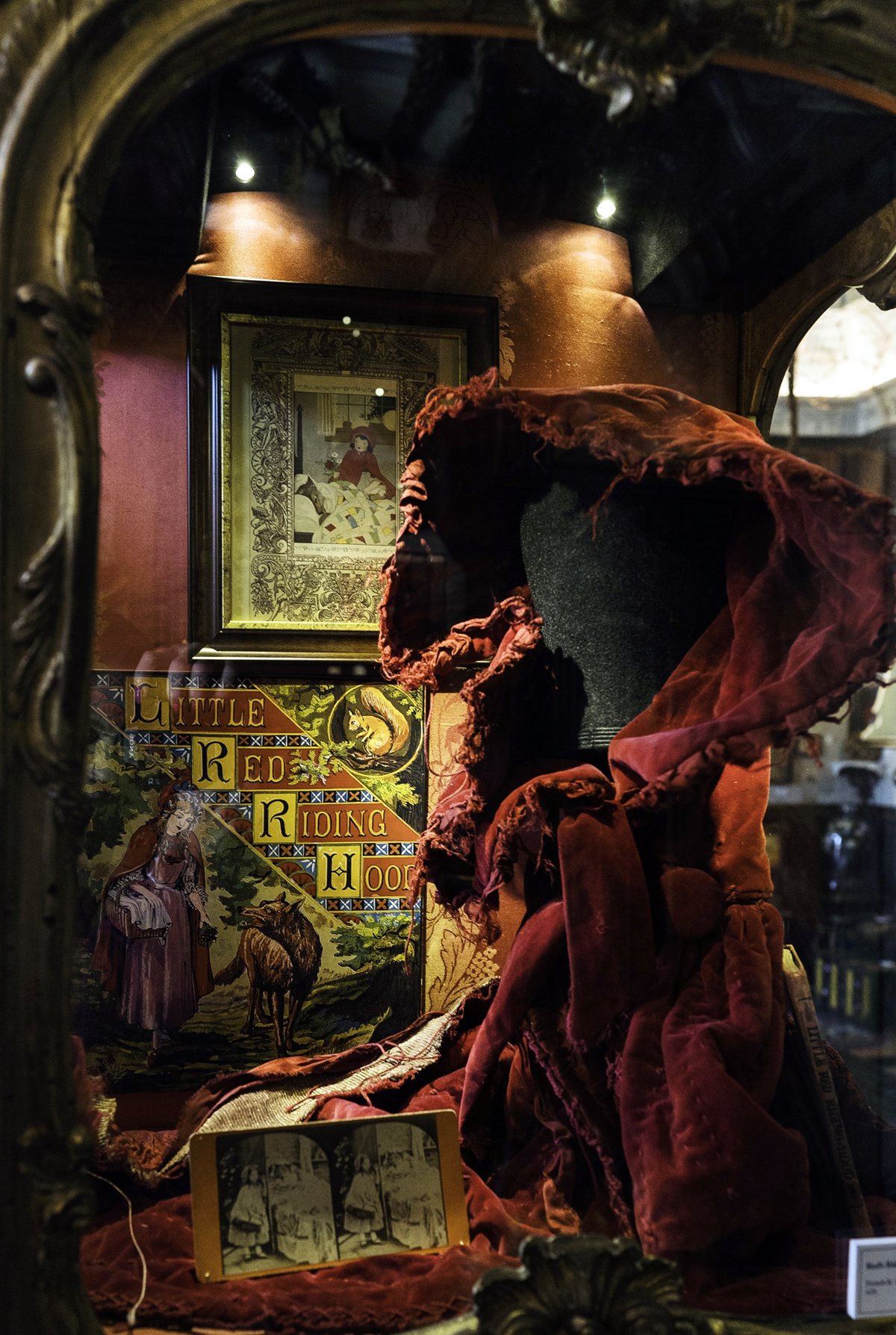Cabinet of Curiosities and Impossibilities
Lonnie Hanzon: Cabinet of Curiosities and Impossibilities
Museum of Outdoor Arts, Marjorie Park
6331 S. Fiddler’s Green Circle, Greenwood Village, CO 80111
Permanent installation
Admission: $10 for adults; $5 for ages 5-20; free for MOA members and children under 5
Review by Madeleine Boyson
Colorado has a wizard, and his name is Lonnie Hanzon. [1] The artist and storyteller has bewitched audiences via storefronts and interactive experiences since 1980, and he now dons his sorcerer’s cap to revamp Cabinet of Curiosities and Impossibilities at the Museum of Outdoor Art’s (MOA) Greenwood Village headquarters, alchemizing fable into history and oddity into treasure.
A view of Marjorie Park with the Cabinet of Curiosities and Impossibilities structure on the left. Image courtesy of Museum of Outdoor Arts (MOA).
Hanzon’s Cabinet originated in a 2009 MOA exhibition in Englewood and remained as a semi-permanent installation until the museum moved to Fiddler’s Green in 2022. The latest iteration opened in April 2024.
The façade of the building that houses Lonnie Hanzon’s Cabinet of Curiosities and Impossibilities at Museum of Outdoor Arts. Image courtesy of Museum of Outdoor Arts (MOA).
Cabinet now comprises a 400-square-foot building in Marjorie Park. Holding court over stone lions and Alice in Wonderland sculptures by Harry Marinsky, its unassuming façade (enrobed in purple-y hues—Hanzon’s signature color) belies the floor-to-ceiling curiosa within.
An installation view of Lonnie Hanzon’s Cabinet of Curiosities and Impossibilities at Museum of Outdoor Arts. Image courtesy of Museum of Outdoor Arts (MOA).
The rabbit hole in Lonnie Hanzon’s Cabinet of Curiosities and Impossibilities at Museum of Outdoor Arts. Image by Madeleine Boyson.
Inside, visitors first meet Lewis Carroll’s universe, with photographs of the historical Alice Liddell and Marinsky’s bronze maquettes. But like the novel’s rabbit hole—installed in the back corner, behind Hanzon’s Keeper’s Mandala doors—Cabinet is a portal to eclectic influences.
A view of the interior and the fairy garden cabinet in Lonnie Hanzon’s Cabinet of Curiosities and Impossibilities at Museum of Outdoor Arts. Image courtesy of Museum of Outdoor Arts (MOA).
Cabinets of curiosity bloomed from Renaissance and Baroque era Kunst- und Wunderkammern (rooms of art and wonder), and Hanzon maintains a traditional interest in specimens and scientific instruments. [2] Telescopes, crystal-encrusted planets, taxidermies, seashells, and lantern slides coalesce in vitrines over mosaic floors and alongside works by other artists.
A detail view of the Red Riding Hood display in Lonnie Hanzon’s Cabinet of Curiosities and Impossibilities. Image courtesy of Museum of Outdoor Arts (MOA).
The Snow Queen’s shattered mirror in Lonnie Hanzon’s Cabinet of Curiosities and Impossibilities at Museum of Outdoor Arts. Image by Madeleine Boyson.
But where early Americans used Wunderkammern to exoticize their world, Hanzon redirects colonial mindsets towards folktales, opting for “relics” from nursery rhymes, Aesop’s fables, and fairy tales over “trophies of imperial conquest.” [3] Three blind mice tails, Red Riding Hood’s velvet cloak, and the Snow Queen’s shattered mirror enchant alongside fairy gardens and magic tools.
An installation view of Lonnie Hanzon’s Cabinet of Curiosities and Impossibilities at Museum of Outdoor Arts. Image courtesy of Museum of Outdoor Arts (MOA).
Hanzon’s Cabinet of Curiosities and Impossibilities will continue to evolve through façade additions, temporary exhibitions, and immersive activations. But right now, it’s a whimsical installation that delights in wonderment, embodying the best of any collection “brought together in the name of the marvelous.” [4]
Madeleine Boyson (she/her) is a Denver-based writer, artist, lecturer, and curator whose work concentrates on American modernism, natural photography, and (dis)ability studies. She holds a BA in art history and history from the University of Denver and volunteers as Development Director for Femme Salée—an online intersectional platform focusing on complex embodiment in the arts.
[1] Hanzon served as “Wizard in Residence” at MOA from 2007 to 2011. The artist has designed the Clocktower Cabaret under Daniels & Fisher Tower, the Wizard’s Chest façades, Camp Christmas at Stanley Marketplace, Coors Field’s The Evolution of the Ball sculpture (1995), and numerous Denver PrideFest installations. From the MOA press release.
[2-4] Joyce Henri Robinson, “An American Cabinet of Curiosities: Thomas Jefferson’s ‘Indian Hall’ at Monticello,” in Acts of Possession: Collecting in America, ed. Leah Dilworth (New Jersey: Rutgers University Press, 2003), 19-23.















